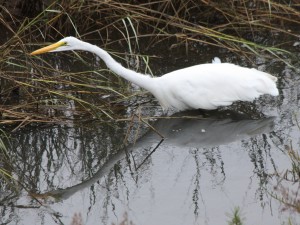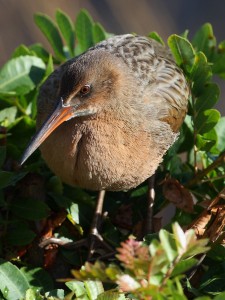Assessment Recommendation 2.2.1 suggests enhancing the connection to Mission Bay. Several projects are in the works to accomplish this recommendation.
Pacific Beach resident Scott Chipman and local organizations including San Diego Audubon Society , Friends of Mission Bay Marshes and the University of California Natural Reserve System are proposing visions for the area where the mouth of Rose Creek meets Mission Bay known as the Mission Bay Gateway. Their proposals seek to enhance the recreational and marine science facilities while also expanding and protecting the Mission Bay marshes, of which only about 2% remain. The goal is to embark upon a planning process that includes the public and the scientific community to develop an environmental, recreational and educational destination in the heart of Mission Bay Park.
Creating wetlands at the mouth of Rose Creek was first envisioned in the Mission Bay Master Plan over 25 years ago and later affirmed in the Rose Creek Watershed Opportunities Assessment in 2005. The development of this vision is timely because long-term city leases in that portion of Mission Bay have or will soon expire. The pending settlement over the closing of the illegal permanent housing at De Anza Mobile Home Park is standing in the way of fulfilling the Mission Bay Master Plan. Scott Chipman and others hope that having a proposed design will help the citizens of San Diego see the potential for this area.
Historically, Rose Creek served as a major seasonal freshwater input to the Mission Bay marshes. This freshwater input and the sediment and nutrients it carries are critical to the health of salt marsh plants such as cordgrass which provide habitat for the endangered Light-footed clapper rail. Creating wetlands at the mouth of Rose Creek would expand the marshes to restore this connection, thereby improving the marsh’s functionality. It could also provide a significant improvement to the quality of urban runoff flowing into the bay. The vision may also include the establishment of a nature interpretive center, enhanced walking paths and viewing areas, and increased opportunities for education and academic research by students including those from nearby Mission Bay High School and UC San Diego.

The Mission Bay Marshes serve as critical foraging grounds for many species of birds, including the great egret. Photo by Roy Little.
San Diego Audubon Society submitted a proposal entitled the Mission Bay Wetlands Feasibility Study to be included on the Wetland Recovery Project’s (WRP) Work Plan. The WRP Work Plan is a mutually agreed upon list of priority wetland restoration projects for Southern California that has been reviewed and vetted among the 18 WRP partner state and federal agencies. Each of those agencies has their own grant programs with their own requirements. Once a project has made it onto the Work Plan, WRP staff provides assistance to the project managers to identify funding opportunities that fit well with the project’s goals and outcomes. This proposal was accepted onto the WRP Work Plan in 2013. Being added to this Work Plan is a significant first step in the implementation of this important project.
Please visit websites for the Mission Bay Gateway Project and Kendall-Frost Marsh Reserve to learn more and get involved.


